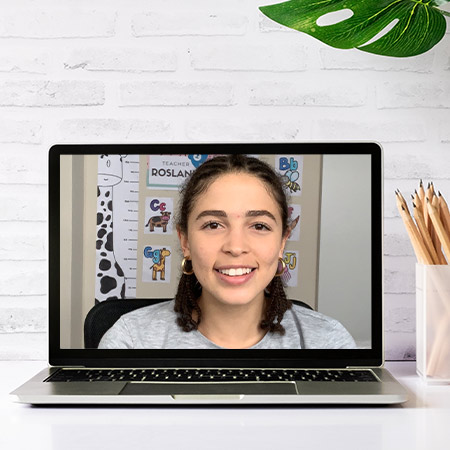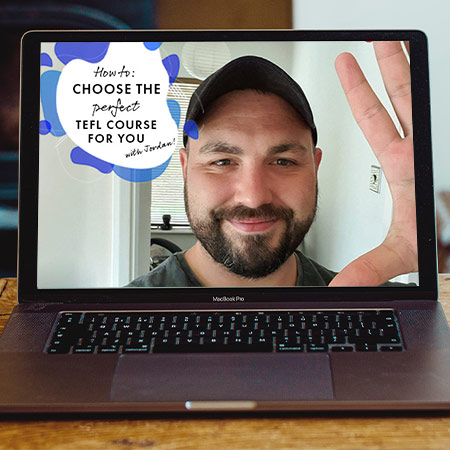Do you fancy teaching English online, either at home or around the world? Are you wondering how to adapt your online lessons for different age groups? TEFL teacher Tabitha went live on i-to-i’s Facebook page to give you her top tips on everything from preparing for trial lessons to where to find materials to use with students of different ages. Watch the full webinar or read on for edited extracts.
TEACHING ENGLISH TO DIFFERENT GROUPS OF STUDENTS ONLINE
What are your top tips for teaching early learners online?
It’s funny, before I got into TEFL, I really didn’t know if I was much of a kids’ person. Teaching early learners completely changed my perspective – so my first tip is to be open-minded. You might go in thinking that you want to teach Business English and discover something totally different.
With early learners, it’s really important to get the buy-in. An adult who’s signed up to the class has chosen to be there. A kid might have been signed up by their parents – there is not that automatic buy-in, so you have to give them that.
A top tip with early learners is to treat the virtual space as an extension of the room you’re in. If your room has got lots of books, think what you can do to bring the books into the lesson. If there’s anything weird or unexpected in your room or your student’s room, that can go into the lesson too. There are some amazing virtual tools you can use online but I really can’t over-state the value of using the stuff in your house.
Don’t feel like you always need to draw on the screen or create amazing PowerPoints. You can simply use a pen and paper. I had a really nice class with a 6 year old from Korea, where we were reading a story and then broke up the lesson by storyboarding, exactly as I’d do in a real classroom. We were holding up our drawings, talking about them, explaining what we’d drawn. It worked really well and felt really interactive.
A lot of people worry about whether they’ll be able to build a connection with students when they’re teaching virtually. I do think it’s possible – I’ve developed the nicest relationships with my virtual students. Being open and transparent that I’m a real person in a real house is a good way of breaking down the ‘I’m in a box’ feeling.
What are your top tips for teaching teenagers online?
A lot of people are scared of teaching teenagers, as they have some of the reluctance of children combined with self-consciousness and insecurities. Teenagers want to share their opinions but might not have the vocabulary yet and that can be frustrating.
I think people often pitch their teaching tone to teenagers as if they were older kids. In my experience, it’s better to teach teenagers as if they’re smaller adults. Don’t shy away from big topics – when I was a teenager, there was nothing I liked more than feeling important because I’d got to talk about climate change or drugs. It’s a way to get their buy-in and show that you respect them and want their opinion. Obviously, it has to be age appropriate and culturally appropriate so check with their parents first if you’re covering a sensitive topic.
I think one of things people struggle with when they’re teaching teenagers is they’re so quiet. I wouldn’t try to get teenagers up and moving in the same way as I would with kids because they’ll find that excruciating. Leave the silence a little bit longer than is comfortable and they’ll start to talk and tell you things.
What are your top tips for teaching adults online?
My top tip for teaching adults is to choose topics which are relevant. A lot of adult learners are aged 18 to 25. There’s no point in bringing up a hot subject from 10 or 20 years ago, like David Cameron being Prime Minister in the UK. Pick something current, pick something interesting and try to tailor it to your student.
This doesn’t mean that you have to plan a unique lesson for every student. Let’s say you have a lesson plan about holidays that’s pitched at your student’s level but is generic. Rather than spending an hour planning a new lesson, take that lesson plan and spend 10 minutes swapping in a section about something you know your student is interested in, like scuba diving. You could teach some vocabulary about scuba diving and include pictures as a good trigger to talk. It feels more tailored, even though it’s your generic lesson plan that you’ve just changed a little bit.
In terms of top tips, remember every student is different but the levels are the same. Even if your student is a professor in Philosophy, if they have an A1 level of English, you’re going to have to focus on the basics in your lesson before you plan a discussion about philosophy. You can’t run before you can walk. Always talk with respect, smile and make the lesson interesting and fun – it’s fine to play games with adult students. They’ll probably enjoy that more than being lectured to.
What are your top tips for teaching Business English online?
There’s a lot of demand for Business English. If you can teach it, it’s a brilliant way to charge higher rates and make more money.
However, my number one top tip for teaching Business English is: don’t say you can teach Business English if you can’t! Business English lessons are priced higher and students expect you to have a really sound knowledge of business terms and business culture and to be able to teach them a lot. i-to-i offers courses on how to teach Business English which I’d highly recommend if you’re interested in teaching in this area. Don’t feel like you can wing it.
My other main tip is that Business English classes don’t need to be super-boring. It doesn’t have to be memorising the words you use for an Excel spreadsheet. You could play a memory game or talk about something controversial.
What are your tips for teaching exam preparation classes?
There’s a big demand for exam prep classes because people need specialist coaching to get past certain levels in those exams. If you’ve got the tools to teach those classes, you can build up a really good student base but be mindful of your own capabilities. If you haven’t been trained to teach exam prep classes and can’t provide the level of expertise that they’re looking for, you’re going to frustrate the student.
I’ve had lots of students approach me but I don’t teach exam prep because I don’t know the IELTS, TEOFL or Cambridge English exams in enough detail. I would hate students not to pass the exams because I don’t have the tools to teach them how to pass.
TEACHING DIFFERENT TYPES OF LESSONS ONLINE
What types of online lessons can I offer?
There are lots of different types of lessons that you can offer, from conversation practice, which is usually pretty cheap, all the way to expensive, specialist classes such as Business English and exam prep. Formal lessons and kids’ lessons are somewhere in the middle of that.
What are your top tips for conversation practice classes?
For a conversation class, don’t think you can just show up and it will be fine. If you book a conversation class, you still want to feel like you’ve learnt and practised something. When I started teaching, I always planned the conversation practices. The students’ feedback was, ‘Wow, I got so much out of it and it was only a conversation practice.’ Be the teacher that puts the effort in.
My top tips for a conversation class are to find and edit an article to the level of the student, so you have lots of vocabulary that they already know with some new words. Read the article once and talk about the new words, the comprehension and the pronunciation. For example, ‘I noticed that you said X. Let’s go through those,’ or, ‘This article is about recycling. What are the recycling rules in your country?’ It’s still a conversation but it’s a guided conversation. They’re getting something out of it and it looks like you did some work.
With lower-level students, pictures are a really good tool. I once did a lesson using wildlife photographs. I closed my eyes and said, ‘Describe one of the pictures to me. Can I guess what it is?’ It won’t take you much time to plan but you will get a lot out of it. Even if you just write a word on a piece of paper and say, ‘That’s our topic today,’ it will help put your student at ease and make your life so much easier because there’s a point to the conversation.
What are your top tips for a formal lesson?
In a formal lesson, your student will expect to practise reading, writing, speaking, listening, grammar and vocabulary. You need to structure the lesson to make sure you hit all of those key skills. My approach is to pick a topic, go through the new vocabulary and grammar, and then build a reading activity, a writing activity and a speaking activity out of that.
It’s good to create a fairly generic lesson that you can then adapt. Plan the lesson with the idea of, ‘I’m going to use this for Tony and then Rebecca and then Sam and then hopefully I’ll get a new student who I can use it with as well.’
What are your top tips for teaching group lessons online?
All of my tips for teaching one-to-one also apply to group lessons but it’s more of a balancing act because you need to keep everybody engaged at the same time. When you’re teaching one-to-one it’s very easy to bring in your books and your props or have a flipchart behind you. With a group class, it’s more difficult – if you’re concentrating too much on what you’re doing, you’re not seeing what your students are doing.
I think you need a plan that facilitates teamwork and that’s where technology comes in handy. All of these platforms have amazing tools to do pair work and group work. It ensures the students are taking part and talking.
As long as it’s not a massive class, you can split the class down the middle and do a kind of relay where everyone has to give their opinion really quickly – or you even could lean into the craziness and have everyone talking at once. Breakout rooms are brilliant. Send them off in pairs, get them to write questions, you can even broadcast a message that goes out. You could say, ‘You’re on mute. You need to use the chat box. You’re off mute, you need to read what’s in the chat box and correct it orally.’
Don’t be scared of the fact that you’re online. As much as possible, it should still be them talking not you talking.
MATERIALS FOR TEACHING ENGLISH ONLINE
What websites do you use to find teaching materials?
A good website I use for TEFL materials for lower-level adults and kids is iSLCollective. It has thousands of worksheets created by teachers that you can download for free. It’s a really good website for basic materials but don’t just download a sheet and think that’s your lesson sorted – teachers can make mistakes and some of the sheets are really old. Read a sheet through carefully and adapt things. For example, I change the names of the people and the photos to make them more diverse and global.
With iSLCollective you can also copy a YouTube link and insert questions, so it becomes an interactive video. I use that all the time with my younger learners, so every 10 seconds, there’s a question like, ‘Quick, what colour was the ball?’ or, ‘The boy is…’ and they have to say something like, ‘Running,’ or ‘Walking.’ It’s really good as it means they’re not just watching a film for four minutes.
Another site I use for adults is ESL Brains which has whole lesson plans. It’s is a subscription service but they do have lots of free lesson plans as well and you can filter by price as well as level and select ‘free’.
The BBC website and newspapers like The Guardian are good if you’re looking for articles and the British Council’s LearnEnglish site is really good for both articles and exercises. It’s also got a page that gives you an overview of what each level of student should know, which I sometimes use as a kind of checklist. Alphablocks is brilliant for phonics and specific pronunciation tips for children.
You can adapt children’s lessons for adults and adults’ lessons for children but do make sure it’s appropriate, even if you’re teaching adults. For example, some people really hate swearing – never assume, always check.
TRIAL LESSONS
What are your top tips for preparing for a trial class with a student?
Before a trial class, I always make contact with the student. As well as showing that you care, it really reduces the chance of a no-show. If your teacher contacts you saying, ‘Hello, I’m so excited for our class,’ and sends you a few questions, it’s a mental prompt. You can also briefly ask them why they’re learning English but I wouldn’t go into too much detail as you’ll cover that in the trial class.
I nearly always encourage students to complete a placement test or share their level of knowledge before the lesson, so I can plan. There are loads of placement tests online. If a student has no idea about their level, send a placement test to them and then you can talk through the results in the trial lesson.
It’s also good to confirm the details with the student before the lesson, such as where the class will take place and the time zone. I know it sounds obvious but it takes away any confusion. I then always send them a reminder on the day of the first lesson, saying, ‘Hi, I’m really looking forward to seeing you later.’
What are your top tips for structuring a trial TEFL lesson?
The first 15 minutes of a trial TEFL lesson is introductions: warming up, getting them comfortable and you can also go through their placement test results. You can ask the student about themselves, how they pronounce their name, if they’ve had lessons before and if they’ve used the platform before. If they haven’t used the platform before, you can show them some features of the website
Now you’ve had 15, 20 minutes, teach them something new. You don’t need to plan a whole hour-long lesson as often you don’t get paid for the trial lesson or only get paid 50 percent but definitely teach them something new, rather than just having a random conversation, so they can understand your style and see if you’re a good fit for them. They’re probably not going to book again with you if they don’t know what your teaching is like.
Spend a lot of the class talking about their goals, how often they want to meet, what their price range is like, etc. At the end of the class, give them some feedback and ask them what they thought of your class – it’s a good opportunity for you to work on yourself as a teacher. Set a short homework exercise and encourage them to book another class. You can say, ‘You’ve talked about this today. Maybe you can do this part for homework. When will I see you again?’ It’s not a guarantee that they’ll book another class with you but it’s pretty likely because they’re motivated to keep going.
How should I follow up after a trial TEFL class?
After the trial TEFL class, message the student to say, ‘Thank you.’ Encourage them to book their next class, mention something specific that they learnt with you and praise them – everybody likes to be praised. Even adults like it when you say, ‘Today we talked about this and I thought it was fantastic when you mentioned X,’ or, ‘I thought that was really interesting and I really liked the way that you used this vocabulary. Maybe you could use this one next time.’ Pull out a specific learning point and the feedback feels much more tailored to them.
FIND OUT MORE
Listen to the full webinar
Book your TEFL course today
Read Tabitha’s blog



